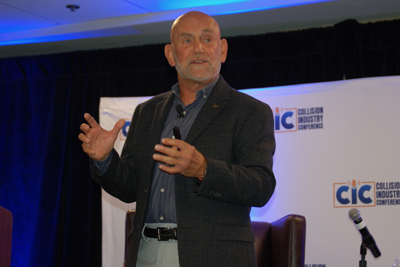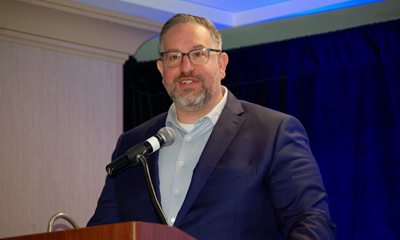Audatex became the second of the Big 3 estimating system providers to say it will offer users more flexibility in establishing or adjusting refinish blend times within the system, according to an announcement made at the Collision Industry Conference (CIC) held in Indianapolis this summer.
Like the other two systems, Audatex currently defaults to a labor time for the blend panel equal to 50% of the full refinish time---though the Audatex system does allow a user to adjust the automated blend hours on estimates. In a change to be implemented in the coming months, the system will still default to 50%, and the user will continue to be able to adjust it on a per-estimate basis, but the Audatex system also will allow a user to set a blend formula at the profile level to any percentage between 50% and 150% of full refinish time for the blend panel.
If the estimate is written at whatever percentage the user has specified at the profile level---whether 50% or as much as 150%---no asterisk will appear next to the labor time; an asterisk will appear if the percentage has been manually adjusted from the percentage set in the profile. A new note also will appear at the bottom of all Audatex estimates showing the blend refinish labor percentage used on that estimate.
The change is expected to appear in the Autatex Database Reference Manual this fall, and then be implemented within the Audatex system by the end of the year. It comes following a Society of Collision Repair Specialists (SCRS) study last year the association believes demonstrated blending takes more time than a full panel refinish, rather than the 50% less time allocated in the three major estimating systems.
CCC Intelligent Solutions this past spring announced it too would give users an option to input their own refinish blend time or set their own default blend value beginning this fall.

“That’s an adjustment based on the conversations, the data and the effort,” Aaron Schulenburg, executive director of SCRS, said of the association’s work on this issue.
Schulenburg and other SCRS leaders at CIC expressed displeasure with what they view as Mitchell International’s failure to address the blend formula issue.
“We’re surprised and shocked at the public vitriol that came out because we’ve been in discussions with [SCRS] since they published the study,” Mitchell’s Jack Rozint said following the meeting. “We continue to research possible changes or modifications or enhancements to our software in this area. We expect to be able to announce something in the SEMA timeframe, at the next CIC meeting.”
In any case, even some advocates for the change admit it could have limited value for collision repairers. Insurers, they say, are likely to require their direct repair shops to maintain the 50% default in their estimating system profiles for DRP claims. Even in non-DRP claims, insurers can---or can try to---push a shop use the carrier’s approved profile when submitting estimates or supplements.
Schulenburg acknowledged at CIC one other potential shop concern about the change.
“There are certainly repairers out there who will say, ‘But now this makes more work for me,’” Schulenburg said. “‘Now I have more things that I need to argue about or justify. I have one more thing that isn’t established. It’s now on the table for me.’”
But Schulenburg argued shops should have the knowledge and the study’s published findings to support a decision to bill beyond the 50% default when appropriate.
“The reality is: We’re the professionals,” Schulenburg said. “You know what you’re performing in your facility. You know what products and processes you are using. You have the justification that you need. This has put the opportunity back on the professional to establish what they’re performing.”
Chairman Calls for Fix to Supplements
Frank Terlep, chairman of the CIC, kicked off the quarterly meeting by walking through what he sees the increased time for shops to get supplements approved is costing multiple segments of the industry.
“We do about 14 million claims a year in this industry, and according to CCC statistics, 60% of those have a supplement,” Terlep said. “In my opinion, that’s not acceptable. But let’s talk about those numbers for a second in a little bit more detail.”
Even if that 60% have even just one supplement, he said, that’s 8.4 million supplements a year. If shops wait an average of 4.7 days for those supplement reviews---the average time shops wait for remote supplement review, according to a CRASH Network survey in June---“that equates to 39 million man-days wasted each year in this industry,” Terlep said. “We’re accepting that. It’s crazy.”
A CIC committee in the 1990s concluded processing a supplement cost both the shop and the insurer about $150. Adjusting that for inflation to $200 each, Terlep said---acknowledging even that estimate is probably low and does not include rental vehicle costs---means “it’s costing this industry more than $3.3 billion every frickin’ year to improperly write” initial estimates or repair plans.
“We’ve got to come together and figure this out,” Terlep said. “The consumer is unhappy. Shops are wasting their time. Insurers’ personnel are wasting their time. All it takes is for us to get together and figure out how do we fix a broken process that’s costing this industry more than $3 billion a year? I challenge this body, the insurers, the shops and everybody in this room to find a way to get together and fix this problem. Because it’s only getting worse, not better.”
Scan Tool Company Updates User Agreement
At industry meetings this past spring, several speakers noted under the terms of the licensing agreement of at least one aftermarket scan tool used in the industry, the user was agreeing to allow the data collected through the tool to be transferred to the company in China, “subject to China laws, including those governing the privacy and security of your information.”
The Autel end-user licensing agreement indicated a shop user also agreed to notify and acquire consent for such collection and transfer of vehicle data “from each customer or prospective customer,” and to the use of the information by the scan tool company “and third parties.”
At CIC, however, a representative of Autel said that licensing agreement has been updated.
“Everyone who logs into their tool for the first time will be opted in to acknowledge it,” said Paul Marshall, senior product and operations manager for Autel. “If you have any questions or concerns about it, you can contact me directly. This is something we did internally, with legal counsel in New York and back at our headquarters in Shenzhen. I think it’s a huge improvement. What was in there was old and was dated. We’d just kind of lost track of it.”














John Yoswick